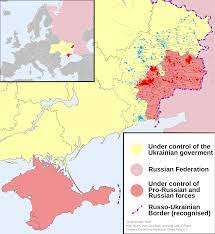Tensions between Russia and Ukraine have continued to escalate after diplomatic talks between the U.S. and Russia failed to bring an end to the crisis.
What started in 2014 with Russia’s annexation of the Ukrainian region of Crimea has evolved into what many fear will become a war with global repercussions.
President Joe Biden said that if Russia invaded Ukraine, it would be “the most consequential thing that’s happened in the world, in terms of war and peace, since World War II.”
“It really is incredibly dangerous,” said associate professor of history, Dave Pretty. “As someone who teaches a course on the first World War, it is very reminiscent of the summer of 1914. Everyone knew then there was a dangerous situation, but no one quite seemed to think just how horrible the possible outcome could be.”
Though the conflict started in 2014, it started to calm down in 2016 with few major moves being made until March 2021 when Russia brought 100,000 soldiers and military equipment near Ukraine’s border.
The troops were partially removed by June but were brought back in Oct., a move made by Russian President Vladimir Putin in order to “study” Ukraine and determine what Russia’s next move will be.
Putin’s purpose for doing this is to try and keep Ukraine out of NATO over fears that they would attempt to reclaim Crimea.
“Let’s imagine Ukraine is a NATO member and starts these military operations,” Putin said. “Are we supposed to go to war with the NATO bloc? Has anyone given that any thought? Apparently not.”
“Putin has long wanted control over his ‘near abroad,’ as Russians tend to officially refer to the former Soviet republics like Ukraine, Belarus and Kazakhstan,” said Pretty. “Putin is very scared of being encircled by enemies.”
In response to this crisis, the U.S. and the United Kingdom have evacuated their embassies in Ukraine capital Kyiv, a move that Ukrainian President Volodymyr Zelenskyy called a “mistake” as he claimed that there is no incoming war between Russia and Ukraine and commented on the impact of these fears on Ukraine’s economy.
“They’re saying tomorrow is the war. This means panic in the market, panic in the financial sector,” Zelenskyy said. “How much does it cost our country? We have been in these situations for eight years. We have learned to live with this and develop with this.”
In a situation where war does come, there have been varied opinions on whether or not the U.S. should be involved.
“What does the U.S. do if it does go in?” said Pretty. “This is even dicier. Becoming involved can, by many predictable paths, lead to the third World War. That is the worst-case scenario, by far. But while the very worst case comes from getting involved, there may be more probable negative outcomes from not getting involved. A loss of prestige from inaction goes far beyond just national pride.”
“I would be a supporter of U.S. involvement,” said sophomore English major, Paige Abercrombie. “I do wonder though if there’s anyone geographically closer that would be able to provide support and if that could possibly even be delivered in a more timely manner.”
“I feel like we’ve had a bad history of joining things that we weren’t supposed to join,” said sophomore political science major, Muluken Hass. “But with the way that Russia’s acting I feel like it’s in the best interest of Ukraine for us to try and diplomatically help them out. Hopefully, we don’t go to war but I don’t know what’s going to happen at this point.”




